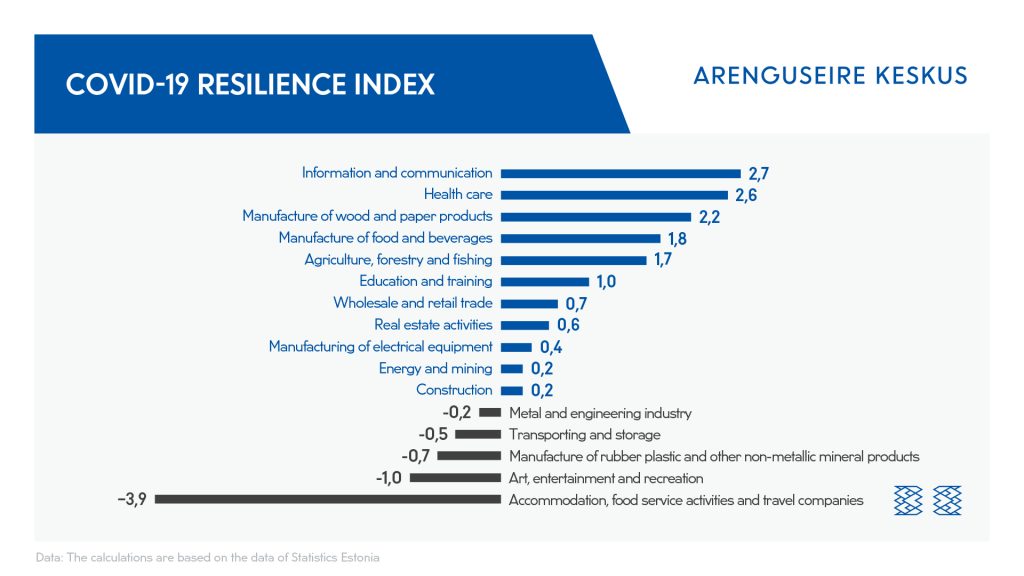The crisis highlights the importance of local energy carriers
Focus on ensuring self-sufficiency during the corona pandemic demonstrates the importance of local energy carriers for Estonia in the future, says the Foresight Centre report “The Impact of the Virus Crisis on the Estonian Economy. Scenarios up to 2030”, soon to be published. The green fuels era in a more distant future could turn out to favour Estonia much more than the fossil fuels era.

“Energy accessibility and supply security of fuels remained intact throughout the virus crisis, but just like with other staple goods, the crisis highlighted the risks and the extent of self-sufficiency,” said the Head of the Foresight Centre Tea Danilov. “Along with the green transition in energy, this shows the importance of increasing efforts to use and develop local energy carriers to ensure energy security.”
She added that these trends were likely to support the development of renewable energy, and the production of green fuels. “There is no oil in Estonia, but producing hydrogen fuels with the help of renewable energy would give us a chance as well,” Danilov said. Automation of production processes increases the importance of electricity as a production input in the economy; the consumption of energy would also grow in connection with the electrification of transport. “Covering this additional demand with domestic renewable energy would bring more profit into Estonia’s economy than the current import of oil products,” Danilov added.
Tea Danilov said that the virus crisis had affected the energy sector mainly through the infected or self-isolating employees. “The temporary drop in the demand for power during the crisis caused problems in keeping the production capacities going and retaining competitiveness on the market because there is no way to store the excess energy,” Danilov explained. “The crisis also made the businesses in the sector more reluctant to invest; investments in the energy sector tend to have a minimum of at least a 15–20 year horizon, which requires investment security.”
Energy and mining industry together employed 1.5% of the labour force, or a little over 8,500 people, in 2019; the importance of the sector in the added value of the Estonian economy was 3.5%, or EUR 857 million.
The monthly turnover of the mining industry has not dropped much compared to the previous year; the monthly turnover of power, gas, steam or conditioned air supply businesses fell 21% in April, compared to last year.
According to the COVID-19 resilience index developed by the Foresight Centre, the energy and mining industry ranks third (0.22 points) among the 17 economic sectors.
COVID-19 resilience index
The COVID-19 resilience index measures the extent to which economic sectors are affected by the coronavirus crisis. The index is based on various economic indicators of companies. The value of the index is between -5 (the largest negative impact) and +5 (the smallest negative impact). The index takes into account the changes in the turnover of companies (total turnover in March–August 2020 compared with the same period the year before) in the economic sector, changes in their number of employees in comparison to 2019 and the dynamics after the emergency situation, changes in labour expenses, and changes in the profit and investments of companies in comparison to the same period last year.

BACKGROUND
- The Foresight Centre started publishing surveys of the impact of the virus crisis on economic sectors on 17 November. On 5 December, the Centre will publish a short summary on agriculture, forestry, and fishing.
- The Foresight Centre will publish the report “The Impact of the Virus Crisis on the Estonian Economy. Scenarios up to 2030” on 8 December.
- The calculations and figures of the surveys use the data of Statistics Estonia. The descriptions of development perspectives are based on interviews with representatives of sectoral associations and the focus group interviews conducted in cooperation with the research group of the Estonian Qualifications Authority OSKA. The Foresight Centre will present the scenarios for exiting the virus crisis on 8 December. Read more: https://arenguseire.ee/en/uurimissuunad/impact-of-covid-19/.
- The impact of COVID-19 on the changes in the employment and skills in hospitality, catering and travel industry is described in OSKA’s special survey, which will be published in early 2021.
The Foresight Centre is a think tank at the Chancellery of the Riigikogu that analyses long-term developments in society and the economy. The Centre conducts research projects to analyse the long-term developments in Estonian society and to identify new trends and development directions.
Latest news
-
27.06 2025Current low birth rate will lead to up to 1.3 billion euros less tax revenue in the future
In its new short report “The impact of population ageing and low birth rate on long-term state revenue and expenditure”, the Foresight Centre notes that the lower than projected birth rate will reduce government spending on family policy and education, but in the long term, it will mean up to 1.3 billion euros less in tax revenue.

 An independent think tank at the Riigikogu
An independent think tank at the Riigikogu 